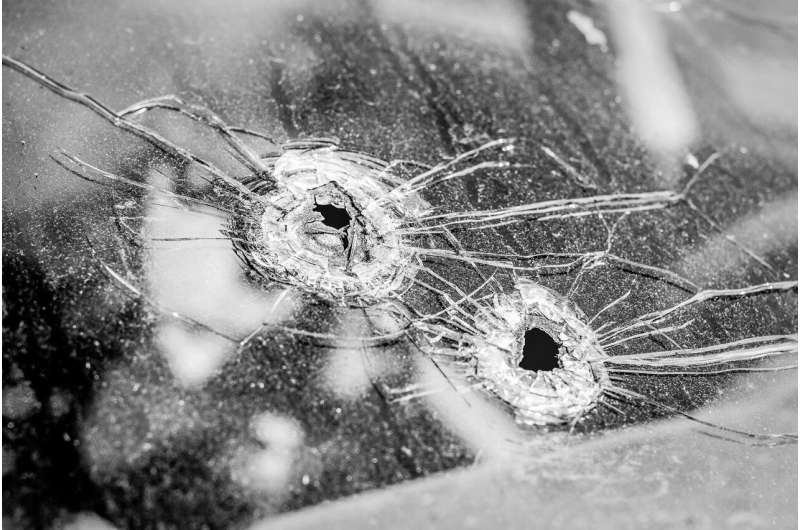Gun violence in Philadelphia plummeted in 2024—researchers aren't sure why, but here are 3 factors at play

Philadelphia experienced a during the COVID-19 years that disproportionately affected and in with drug markets.
In 2020, Philadelphia had 499 homicides— than the previous year. Gun violence worsened in 2021—with that year—and then dropped slightly in 2022.
Fortunately, recent data shows a notable decline in these crimes over the past two years. As of late September 2024, homicides are down . And the has decreased similarly—from 1,236 in the first eight months of 2023 to 758 for the same period in 2024.
As of who live in Greater Philadelphia, we know that there is no single explanation for the drop in gun violence. Rather, many factors at both the local and national levels could be playing a role.
Police and justice system return to (sort of) normalcy
A shortage of police—driven by , retirements and injuries—significantly affected cities like Philadelphia.
Additionally, the Philadelphia Police Department's number of traffic and pedestrian stops dropped drastically. This was due to both the need to adhere to social distancing guidelines during the and a to engage with citizens after massive protests in response to the murder of George Floyd. In fact, the number of documented stops from 2019 to 2020 alone.
As the year progressed, the department struggled with . This allows police and firefighters injured on the job to collect their full salaries.
By September 2021, were out of work on "no duty" disability leave, according to investigations by both and .
Though up-to-date data is unavailable, there was a by December 2022, 10 months after the Inquirer investigation was published.
More recently, the Philadelphia Police Department has attempted to increase its ranks through . It also and .
Despite these efforts, staffing remains . This places considerable strain on the existing workforce.
Of course, the COVID-19 years and beyond in Philadelphia. , cases backlogged, probation and parole officers were less able to supervise individuals in the community, and the . The city's array of and violence intervention programs were also disrupted.
The post-pandemic resumption of court operations, improved violence intervention programs, police recruitment efforts and reduced disability claims may help explain the recent drop in shootings.
New leadership and crime-fighting strategies
Reducing gun violence was a during Philadelphia's 2023 mayoral race.
Mayor Cherelle Parker, , on her first day in office.
She also as police commissioner in charge of the . Bethel, second in command under former Commissioner Charles Ramsey, quickly that focused on crime reduction in high-crime districts, shutting down open-air drug markets in Kensington and to tackle violent crime.
Philadelphia has also adopted new policing strategies and technologies.
In early 2022, before Parker and Bethel's tenure, the Philadelphia Police Department under former Commissioner Danielle Outlaw designated a . In 2021, , a failure that can fuel , —which refers to a drop in trust of the legal system—and communities resorting to .
While it's not yet clear what effect the new unit has had in Philadelphia, research shows such units that prioritize resources to solving nonfatal shootings in places such as and have reduced gun violence.
More recently, the city began deploying on weekends to flood high-crime areas with officers to deter potential criminal activity.
Meanwhile, the reduction in crime within its patrol areas to the implementation of safety measures, including new equipment for officers such as firearms and radios, upgraded security cameras and advanced technology such as license plate readers, which help identify stolen vehicles or those linked to criminal behavior.
National crime trends
While local initiatives have likely contributed to Philadelphia's drop in violent crime, these improvements also fit into as cities across the U.S. .
Economics and public safety expert John Roman, for example, and to pandemic-related losses in government staffing and functionality, which he argues returned to prepandemic levels in late 2023.
Roman shows how government jobs were lost nationally at the outset of COVID-19, with coming at the local level. These local government employees, such as social and outreach workers, often connect people in marginalized communities that bear the brunt of gun violence to crucial services such as trauma counseling, victim advocacy and legal assistance.
In Philadelphia, were lost between 2019 and 2022. The reopening of social services and increase in those jobs and community-based interventions post-pandemic may have helped stabilize Philadelphia's neighborhoods.
. This current drop appears to align with a national de-escalation in violent crime. These factors, alongside the statistical phenomenon of —where crime rates normalize after extreme spikes—apply to both national and local crime rates.
Some researchers, , have also considered the possibility that the recent 2020–2022 homicide peak killed a portion of the most violent offenders who drive shootings in their neighborhood. It's based on the concept of the that those at the highest risk of violence are often offenders themselves.
But crediting Philadelphia's decline in homicides and violent crime to any single cause oversimplifies a much more intricate picture. While the exact causes of these shifts are complex, understanding the interplay of local and national forces is essential to sustaining this positive trajectory.
Provided by The Conversation
This article is republished from under a Creative Commons license. Read the .![]()



















